This hits directly in a male's prowess.
Testicular cancer is an abnormal, quick, and invasive growth of cancerous cells in the testes, male's gonads.
The precise factors that trigger testicular cancer are largely unknown, but several risk factors have been detected, like a medical history of undescended testicle(s), abnormal testicular development, Klinefelter's syndrome (a sex chromosome disease determined by an extra X female chromosome in males and characterized by low testosterone levels, sterility, development of breasts, and small testes), previous testicular cancer, exposure to certain chemicals and HIV infection.
There also seems to be a genetic factor but vasectomy has not been linked to testicular cancer.
Between 6,000 and 8,000 men are diagnosed with testicular cancers annually in US.
And even if this cancer type accounts for only 1% of all male cancers, it is the most common cancer type in young men aged 15 to 40 years.
White American men are five times more prone to develop it than African-American men and more than twice than Asian-American men, but the causes for these differences are not known.
Now, a new research has shown that testicular cancer survivors have a higher risk of dying from non-cancer causes than the general population.
Even if survival rates for men with testicular cancer have greatly increased, the treatments could raise patients' risk for other health problems, such as second cancers, heart disease, and infertility.
A team led by Dr. Sophie Foss?, of the University of Oslo in Norway, monitored the risk of non-cancer deaths in 38,907 testicular cancer patients who had survived for at least one year post-diagnosis and received chemotherapy after 1974.
After an average follow-up of 10 years, 2,942 patients had died from non-cancer causes, an increase of 6 % relative to the non-cancer deaths in the overall population.
The subjects displayed higher risks of dying from all non-cancer causes, infections, circulatory diseases and respiratory diseases.
And the more vulnerable category proved to be men diagnosed before age 35, regardless of treatments.
"Additional long-term follow-up studies of testicular cancer patients that include detailed information on treatment and comorbid conditions will be required to adequately assess the incidence of the [secondary complications] of testicular cancer and its treatments?In the interim, clinicians and patients should be aware of recently published strategies for the long-term medical care of testicular cancer survivors," noted the authors.

 14 DAY TRIAL //
14 DAY TRIAL //